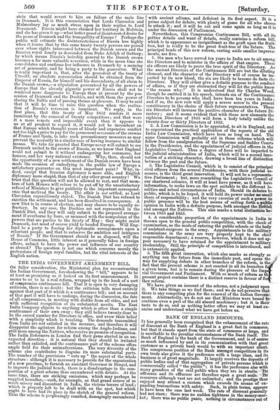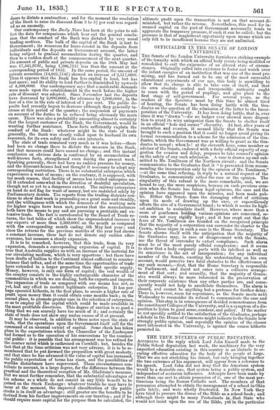BANK OF ENGLAND DISCOUNTS.
IT has generally been recognized that the enhancement of the rate of discount at the Bank of England is a great fact in commerce, but that it stands apart from the state of commerce at large, and is ascribable to the peculiar circumstances of the Bank itself. The Bank of England is the bank of the Government, and is of course as much influenced by and in its communication with that great customer as a private bank would be with an important client. The conspicuous position of the Bank amongst competitors'in its own trade also gives it the preference with a large class, and its business is of great magnitude. It largely receives the deposits of public bodies and of that aggregation of private persons which is commercially called " the public"; it has the preference also with many grandees of the said public when they are in straits. Its affluence and its effluence are therefore upon a great scale. Its resources although vast are not unlimited; and the prestige thus enjoyed may attract a custom which exceeds its means of ex- panding transactions with safety. Such, in plain terms, appears to have been the case last week. The rate of discount generally had not risen; there was no sudden tightness in the money-mar- ket; there was no public panic, nothing in circumstances out of
doors to dictate a contraction ; and for the moment the resolution of the Bank to raise its discount from 3 to 31 per cent was regard. ed as an anomaly.
Our contemporary the Daily News has been at the pains to col- lect the data for comparisons which bear out the general conclu- sion that the conduct of the Bank was dictated by very usual trading motives. The bulk of the capital of the Bank is lent to Government ; its resources for loans consist in the deposits from individuals and the deposits on Government account, the latter being subject to gradual accumulation during the quarter, and then to a sudden draft at the commencement of the next quarter. Its amount of public and private deposits on the 28th May last was 17,541,970/., being 1,206,711/. less than the amount at the corresponding period of 1852. In the same period, the amount of private securities (14,021,7141.) showed an increase of 3,317,069/. Thus it appears that the Bank has less capital to lend, but has lent more ; and its ability to lend further is diminished by upwards of 4,500,000/. Our contemporary says that considerable demands were made upon the establishment in the week before the higher rate of discount was adopted. Since November last the deposits have decreased by 2,000,000/., the advances by 2,000,000/., in the face of a rise in the rate of interest of 1 per cent. The public de- posits had recently begun to decrease although they generally in- crease at this period of the quarter ; the suspension of payments on account of the duties to be reduced being obviously the main cause. There was also a probability amounting almost to certainty that the largest customer of the Bank, the Government, would be wanting further assistance. These facts sufficiently explain the conduct of the Bank : whatever might be the state of trade generally, the Bank was clearly called upon to husband its own resources, for its own safety and its own interests. The state of trade remained very much as it was before—there had been no change there to dictate the measure in the Bank, and that measure could have caused no change ; and this instant conclusion on obvious data is confirmed by an accumulation of well-known facts, strengthened even during the present week. Speaking generally, there had been no sudden pressure for money, and the discount-houses had not thought it necessary to adopt any corresponding restriction. There is no substantial enterprise which experiences a want of means ; on the contrary, it is supposed, with too much reason, that facility of means has excited enterprise un- til it extended somewhat in the direction of doubtful speculation, though not as yet to a dangerous extent. The railway enterprises on hand do not flag for want of money, but are restricted solely by Parliamentary doubts. The reports from the trading districts con- tinue to show that work is proceeding on a great scale and steadily, and the willingness with which the demands of the working men for higher wages have been met, proves that the manufacturers both have the means to pay and are pursuing a profitable and ex- tensive trade. The fact is corroborated by the Board of Trade re- turns, the last tables of which show the unprecedented increase in our exports of more than 2,300,000/. on the month as compared with the corresponding month ending 5th May last year ' • and since the returns for the previous months of the year had shown a constant increase, these last do not denote any sudden effer- vescence, but measure a steady expansion. It is to be remarked, however, that this trade, from its very expansion, demands a corresponding expansion of capital. It is true that Australia supplies us with an increase of the material for our circulating medium, which is very opportune : but there have been drafts of bullion to the Continent almost sufficient to counter- balance that influx, and at the same time the opportunities of trade have extended in a larger proportion than that specific supply. Money, however, is only one form of capital ; the real wealth of the country consists in the highly exchangeable character of the commodities in which we are dealing, both for exports and imports. The expansion of trade as compared with our means has not, as yet, had any effect to restrict legitimate enterprise. It has per- haps operated hitherto, in the first place, to secure a higher rate of profit upon money than it could obtain some months back ; in the second place, to promote greater care in the selection of enterprises, so as to employ all the capital which could be made available in the most profitable directions. This degree of caution is sogood a thing that we can scarcely have too much of it; and certainly the state of trade does not show any undue excess of it at present.
It may be observed, in addition to these notes upon the state of trade, that the operations upon the Government itself call for the command of an unusual extent of capital. Some check has taken place in the expectations which the Chancellor of the Exchequer had formed as to the operation of his conversions by the commer- cial public : it is possible that his arrangement was too refined for the coarser mind which is enthroned on Cornhill ; but, besides the fact that at the time criticism was not very adverse, it is to be re- membered that he put forward the proposition with great modesty, and that since he has advanced it the value of capital has increased, the public expectation of terms has risen, and the possibilities of warlike disturbance have supervened. These circumstances con- tribute to account, in a large degree, for the difference between the practical and the theoretical reception of Mr. Gladstone's measure. But we must further remember, that the substantial advantages of his scheme as a whole do not consist in any little benefit to be gained on the Stock Exchange : whatever trouble he may have to incur at the moment, the improved classification of the public stocks is in itself an advantage ; still greater are the benefits to be derived from his further improvements on our taxation ; and if he should require more capital for the purpose than he calculated, the ultimate profit upon the transaction is not on that account di- minished, but rather the reverse. Nevertheless, this need for in- creased capital on the part of Government necessarily tends to aggravate the temporary pressure, if such it can be called ; but the pressure is that of magnificent opportunity upon means which are only felt to be insufficient because they are not unlimited.

























 Previous page
Previous page